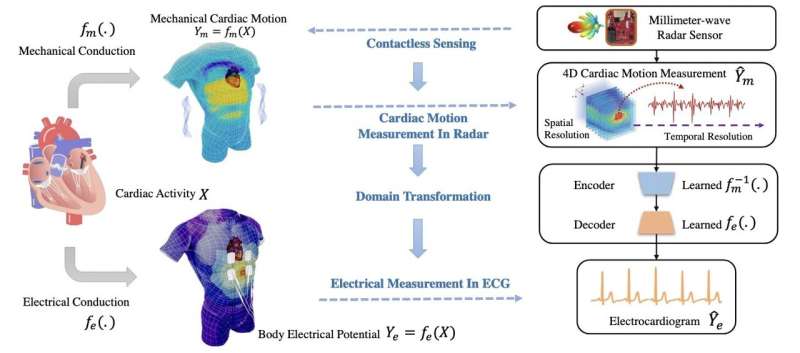
Recently, a team led by Prof. Chen Yan and researcher Sun Qibin from the University of Science and Technology of China (USTC) achieved contactless electrocardiogram (ECG) monitoring through a millimeter-wave radar system. Their work was published in IEEE Transactions on Mobile Computing and reported by IEEE Spectrum.
Chronic and cardiovascular diseases (CVDs) claim the lives of about 18.6 million people each year. Continuous ECG monitoring has been proven to be crucial to diagnosing CVDs, and thus is widely utilized in the early diagnosis and subsequent treatment of CVDs.
However, current ECG monitoring requires body-attached electrodes which leads to an uncomfortable user experience. Therefore, it is challenging to implement long-term continuous ECG monitoring in daily life, which leads to the loss of transient abnormal ECG states and delays in the diagnosis of CVDs.
To solve this problem, the team developed millimeter-wave radar to measure cardiac mechanical activity rather than electrical activity. They first scanned the heart using the millimeter-wave radar, then filtered the reflections to extract 4D cardiac motion signals using a series of signal processing algorithms. Finally, a data-driven deep neural network was applied to model the nonlinear relations between cardiac mechanical conduction and electrical conduction and solve the domain transformation problem, consequently reconstructing the ECG.
In this study, the team conducted 200 experimental trials on 35 participants during four different physiological states to simulate daily conditions. The radar was placed within 0.5 meters above the torso, preventing any skin irritation or any other discomfort from direct skin attachment.
The team achieved a median timing error of less than 14 milliseconds and a median morphology accuracy higher than that of over 90% of conventional ECG methods. This new method also achieved a 90-percentile error of 9ms for R-R interval timing, which is the golden standard for diagnosing heart arrhythmia, further verifying its medical value.
Source: Read Full Article
